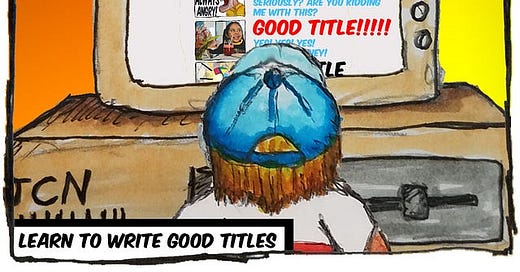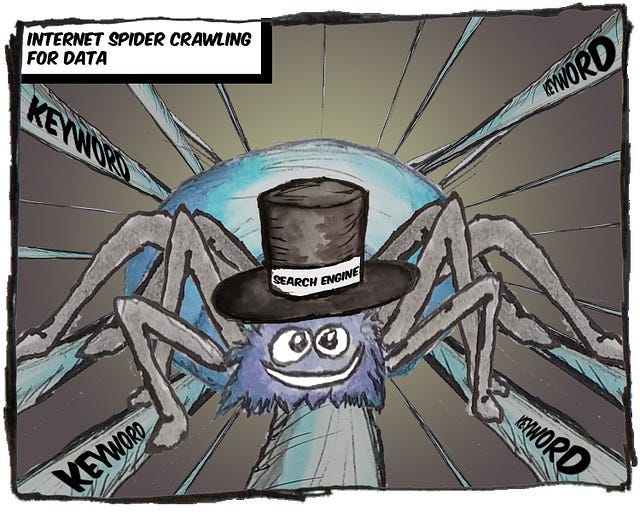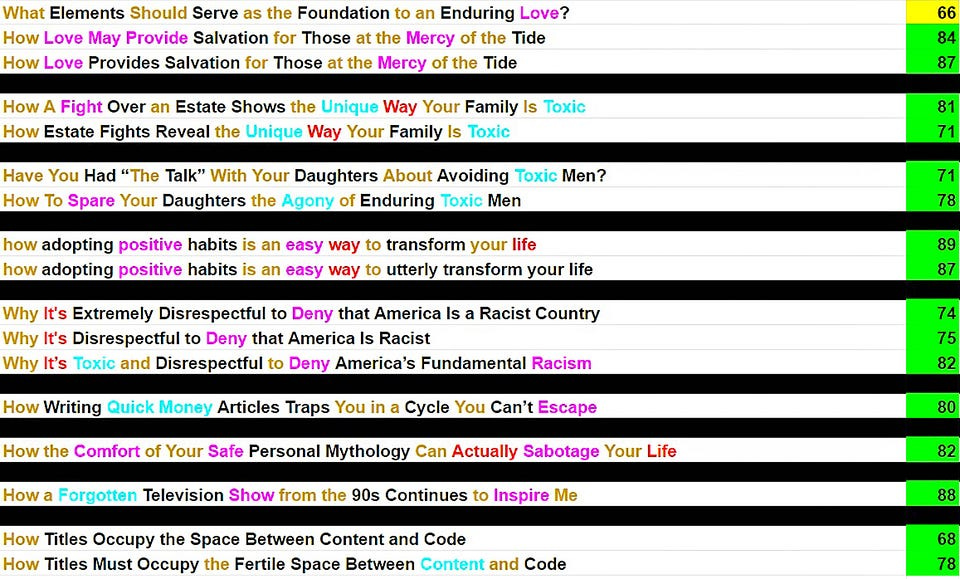How Titles Must Occupy the Fertile Space Between Content and Code
Mastering the art of writing a headline will help get your story the attention it deserves
Hello friends,
I often see great articles fail because of bad titles. There are a lot of writers out there who refuse to accept that the digital age has fundamentally altered how readers interact with the written word.
Modern titles have a much more complex and significant purpose than titles of the past. The old rules no longer apply. There’s no going back, so quit being stubborn and learn how to optimize your title.
It’s an indisputable fact that writing is much different than it was even five years ago. I’m not telling you that you have to like it. In fact, your feelings on the matter are completely irrelevant. But if you want to succeed, you have to accept the reality of the marketplace where your work will appear.
Today, your titles have to function at the point of confluence between writing and coding. For me, it helps to visualize the spot where the river meets the sea. The water there contains elements of both environments. The same thing needs to be true of your title.
SEO, spiders, and algorithms, oh my!
When I lived in Peru, I had a friend named Travis who was a programmer. He was a very meticulous and intelligent individual, and he ended up being the best man at my wedding (as I was at his).
He had a home office at his apartment that consisted of a computer that he had built by himself, and a wall of monitors that curved around his desk like you might see on the deck of the USS Enterprise. I only got to go into that room once because he didn’t like allowing visitors into his workspace.
Everything was precise, everything was in order, everything was set just the way he wanted it.
As for me, every morning I have to excavate my computer from under a pile of laundry. In the evenings, I go through my pockets for crumpled papers containing illegible notes that I’ve scribbled to myself.
Travis’s world was one of SEO optimization, digital spiders, and algorithms. Mine consisted of bits of inspiration I meticulously harvested from the ether and then promptly lost. We seemed as different as night and day, so hanging out together was like existing in perpetual dusk.
I soon discovered that it’s fascinating to dwell in half-light and observe the various ways apparent opposites tend to overlap. There’s a reason that the time before sunset is called the magic hour.
Metadata and writing
When Travis helped me set up my first blog, he insisted that I do a couple things “behind the scenes” to make the page more visible to search engines. One of these things was to insert an invisible line of code at the top of the page that contained a bunch of meta keywords. My page was about Peru, so my keywords were things like Machu Picchu, Lima, Ceviche, Spanish, etc. Travis also made me include various misspellings because people always spell things wrong.
It seemed like a colossal waste of effort to spend all this time on something nobody would ever see. Fortunately, Travis put it into terms I could understand.
“Metadata is like the Dewey decimal system for the internet,” he said. “We’re filling out the card that will be stored in the catalog for interested readers to find. This way, anyone who comes along looking for anything that’s related to your site will be directed to you.”
This represents one of the fundamental perspective shifts that all modern writers have to make. In the past, writers could occupy themselves entirely with writing. We left it up to the librarians to create our catalog card. Today, in addition to writing, writers must also fill out and file a card or nobody is going to ever find your work.
Meta keywords are less important now because the search engines figured out the bloggers were rigging the game to generate artificial traffic. But, in some ways, your title serves the same purpose.
A title is part content and part code
The hardest part about writing a title is that it has to be captivating to two diametrically opposed audiences. It has to contain information that will be of use to promotional algorithms, and it must be sufficiently tantalizing to entice a human audience. On top of all that, you have to achieve this within a limited amount of characters.
Sigh…
The good news is that you don’t have to learn coding in order to do it. There are plenty of headline analyzer tools out there, and I suggest you use them. Sometimes you end up with something that seems like a bit of a word salad, but overall I tend to see the best results from titles that score well.
Here’s an example of my title workshopping process:
I don’t use headline generator tools. I prefer to settle on my titles through trial and error.
Words that get a reaction
When you’ve been at this game for a while, you start to notice the words that seem to give your articles an advantage. A couple years ago, the digital community was captivated by the word “narcissist” and all of its variations (“narcissism,” “narcissistic,” “narcissists,” etc.).
I found that on some platforms, all you had to do was write a 200 word article with some form of “narcissist” in the title, and you’d make a couple hundred bucks. I used to write two or three of these articles in the morning before I got started with my real work. It was like throwing darts in the dark, but quite a few of them landed in the money.
Another useful tactic is to take advantage of question words, particularly “how” and “why.” Question words have the benefit of coming at the beginning of the sentence. People react differently if they’re asked a question versus simply being subjected to a statement. A question word indicates the expectation of a response, so readers instinctively perk up and listen. This effect remains in place even when a sentence that starts with “how” doesn’t turn out to be a question.
Consider the difference:
How Titles Must Occupy the Fertile Space Between Content and Code
Titles Must Occupy the Fertile Space Between Content and Code
The second one feels complete. It’s like a trailer that shows all the best parts of the movie. Readers don’t click on that because they don’t feel as if there’s anything else to learn. The first one offers the promise of more information that’s related to the interesting concept of the title.
Create a new “hat” for working on titles
Do whatever you have to do to reset your brain to prevent yourself from sabotaging articles with ineffective titles.
Writing already entails a process of changing hats. You write while wearing your writer hat. When you finish a draft, you take off the writer hat and put on an editor hat.
In the modern marketplace, you need another hat that’s specifically tailored for the process of composing titles. You can construct this hat by taking half of a writer hat and stitching it to half of a programmer hat.
Writing a title is like standing in a doorway between two worlds. Your door must be open, your door must be relevant, and your door must be inviting. Once you have created the perfect door, the crowds start marching through.
Publishing an article without a well-optimized title is like sending an astronaut into space without a helmet.
“I'd rather Be Writing” exists because of your generous support. If you have the means please consider upgrading to a paid sponsorship. I have payment tiers starting at as little as twenty dollars a year. I'm so happy you're here, and I'm looking forward to sharing more thoughts with you tomorrow.
My CoSchedule referral link
Here’s my referral link to my preferred headline analyzer tool. If you sign up through this, it’s another way to support this newsletter (thank you).








I read Substack, I’m not a writer. But I really enjoyed this insightful article! Who knows, maybe someday I’ll venture into that space? In the meantime, I’ll reads and learn😉. Thanks
This is the reality for writers and titles now but it is not a bad one! It's all about meeting readers where they are - at your doorstep. Open it and welcome them in!